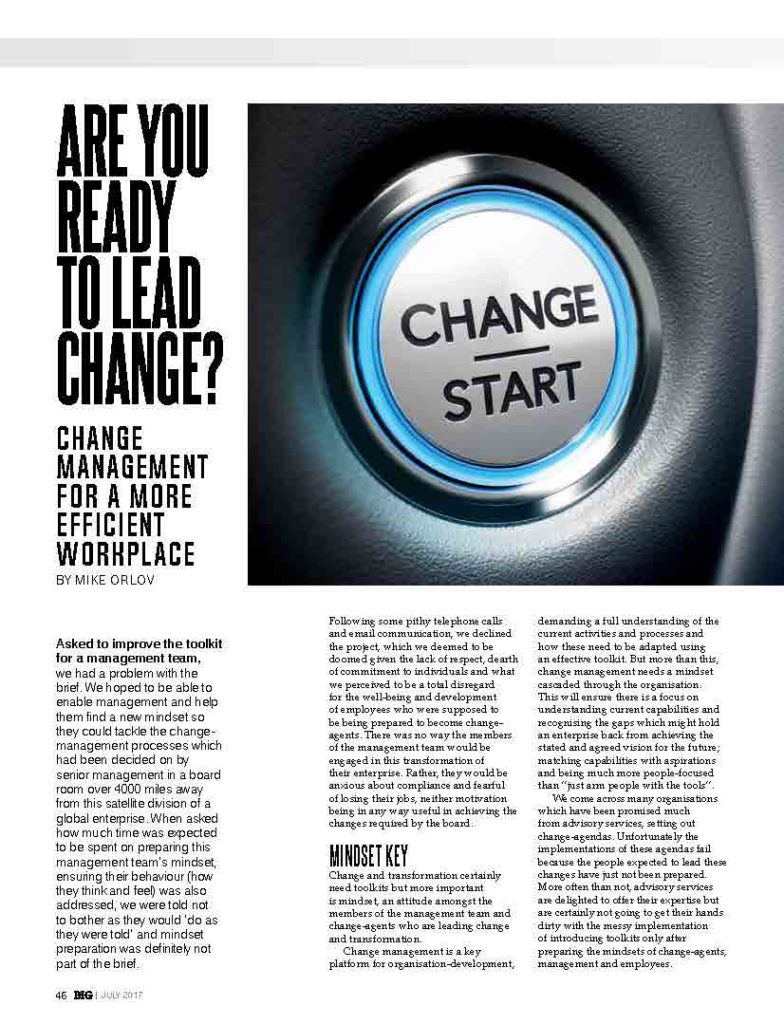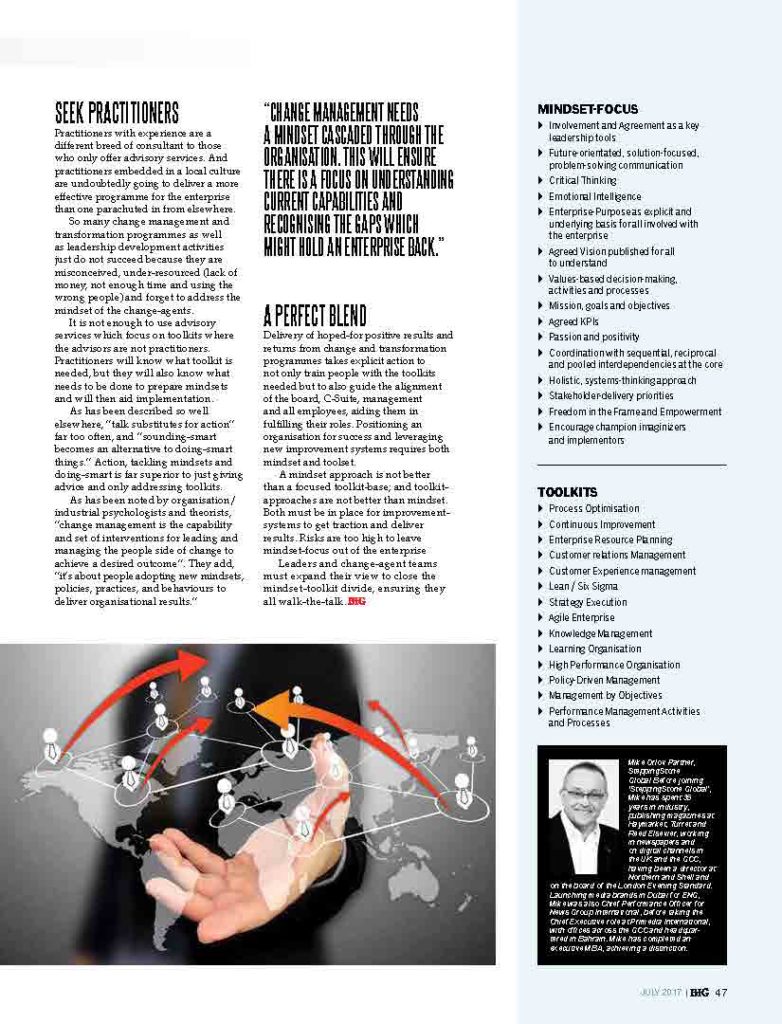

Are you ready to lead change?
‘Walking-the-Talking’ and’ Changing-Mindsets’ as well as ‘Equipping-with-New-Toolsets’
Asked to improve the toolkit for a management team we had a problem with the brief. We hoped to be able to enable management and help them find a new mindset so they could tackle the change-management processes which had been decided on by senior management in a board room over 4,000 miles away from this satellite division of a global enterprise. When asked how much time was expected to be spent on preparing this management team’s mindset, ensuring their behaviour (how they think and feel) was also addressed, we were told not to bother as they would ‘…do as they were told…’ and mindset preparation was definitely not part of the brief.
Following some pithy telephone calls and email communication, we declined the project which we deemed to be doomed given the lack of respect, dearth of commitment to individuals and what we perceived to be a total disregard for the well-being and development of employees who were supposed to be being prepared to become change-agents. There was no way the members of the management team would be engaged in this transformation of their enterprise. Rather, they would be anxious about compliance and fearful of losing their jobs, neither motivation being in anyway useful in achieving the changes required by the board.
Change and transformation certainly need toolkits but more important is mindset, an attitude amongst the members of the management team and change-agents who are leading change and transformation.
Change management is a key platform for organization-development, demanding a full understanding of the current activities and processes and how these need to be adapted using an effective toolkit. But more than this, change management needs a mindset cascaded through the organization. This will ensure there is a focus on understanding current capabilities and recognizing the gaps which might hold an enterprise back from achieving the stated and agreed vision for the future; matching capabilities with aspirations and being much more people-focused than ‘…just arm people with the tools’.
We come across many organizations which have been promised much from advisory services, setting out change-agendas. Unfortunately the implementations of these agendas fail because the people expected to lead these changes have just not been prepared. More often than not, advisory services are delighted to offer their expertise but are certainly not going to get their hands dirty with the messy implementation of introducing toolkits only after preparing the mindsets of change-agents, management and employees.
Practitioners with experience are a different breed of consultant to those who only offer advisory services. And practitioners embedded in a local culture are undoubtedly going to deliver a more effective programme for the enterprise than one parachuted in from elsewhere.
So many change management and transformation programmes as well as leadership development activities just do not succeed because they are misconceived, under-resourced (lack of money, not enough time and using the wrong people) and forget to address the mindset of the change-agents.
If enterprises are serious about improving leader-performance, streamlining operations, lifting the levels of employee engagement, job enrichment or any one of the other objectives for organization-development, then members of the senior management team need to recognize the relationship between mission and vision, capabilities and aspirations, objective measures of shifting mindsets and the evaluation of efforts implementing programmes in the enterprise.
It is not enough to use advisory services which focus on toolkits where the advisors are not practitioners. Practitioners will know what toolkit is needed, but they will also know what needs to be done to prepare mindsets and will then aid implementation.
As has been described so well elsewhere, ‘…talk substitutes for action…’ far too often, and ‘…sounding-smart becomes an alternative to doing-smart things…’ Action, tackling mindsets and doing-smart is far superior to just giving advice and only addressing toolkits.
As has been noted by organization / industrial psychologists and theorists, ‘…change management is the capability and set of interventions for leading and managing the people side of change to achieve a desired outcome’. They add. ‘…it’s about people adopting new mindsets, policies, practices, and behaviours to deliver organizational results’.
Delivery of hoped-for positive results and returns from change and transformation programmes takes explicit action to not only train people with the toolkits needed but to also guide the alignment of the board, C-Suite, management and all employees, aiding them in fulfilling their roles. Positioning an organization for success and leveraging new improvement systems requires both mindset and toolset.
A mindset approach is not better than a focused toolkit-base; and toolkit-approaches are not better than mindset. Both must be in place for improvement-systems to get traction and deliver results. Risks are too high to leave mindset-focus out of the enterprise
Leaders and change-agent teams must expand their view to close the mindset-toolkit divide, ensuring they all walk-the-talk.
Mindset-Focus
- Involvement and Agreement as a key leadership tools
- Future-orientated, solution-focused, problem-solving communication
- Critical Thinking
- Emotional Intelligence
- Enterprise-Purpose as explicit and underlying basis for all involved with the enterprise
- Agreed Vision published for all to understand
- Values-based decision-making, activities and processes
- Mission, goals and objectives
- Agreed KPIs
- Passion and positivity
- Coordination with sequential, reciprocal and pooled interdependencies at the core
- Holistic, systems-thinking approach
- Stakeholder-delivery priorities
- Freedom in the Frame and Empowerment
- Encourage champion imaginizers and implementors
Toolkits
- Process Optimisation
- Continuous Improvement
- Enterprise Resource Planning
- Customer relations Management
- Customer Experience management
- Lean / Six Sigma
- Strategy Execution
- Agile Enterprise
- Knowledge Management
- Learning Organisation
- High Performance Organisation
- Policy-Driven Management
- Management by Objectives
- Performance Management Activities and Processes
